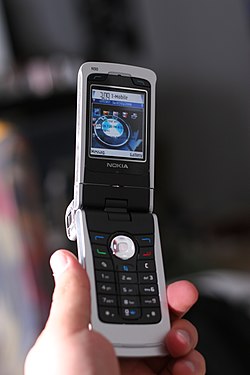Nokia N90
This article needs additional citations for verification. (December 2009) |
 | |
| Manufacturer | Nokia |
|---|---|
| Availability by region | 2005 |
| Predecessor | Nokia 6260 |
| Successor | Nokia N93 |
| Related | Nokia N92 |
| Compatible networks | GPRS, EDGE, WCDMA |
| Form factor | Clamshell |
| Dimensions | 112x51x24 mm |
| Weight | 173 g |
| Operating system | Symbian OS v8.1a, Series 60 Feature Pack 3 |
| CPU | TI OMAP 1710, 32-bit RISC ARM9 @ 220 MHz |
| Memory | 48 MB |
| Removable storage | DV RS-MMC / MMC-Mobile |
| Battery | BL-5B, 3.7 V, 760 mAh |
| Rear camera | 2 Megapixels |
| Display | TFT, 262,144 colours, 352×416 pixels |
| External display | TFT, 65,536 colours, 128×128 pixels |
| Connectivity | USB (v2.0), Bluetooth (v1.2) |
| Data inputs | Keypad |
The Nokia N90 is a smartphone, announced as part of Nokia's new line of multimedia devices, Nseries, on April 27, 2005.[1] It had a unique swivel design encompassing four 'modes'. It has two displays and has a camera with Carl Zeiss optics and integrated flash, and can record video with audio. The screen can be swiveled 270° to let the phone be handled more like a conventional video camera. The camera lens can also be swiveled. The phone has no vibration feature. The 2.1-inch display has a pixel density of 259 ppi, which made it incredibly sharp and the crispest Nokia screen at the time, and continued to be joint-highest with the N80, E60 and E70 for a remarkable five years, before being beaten by the Nokia 5250 in 2010. The Nokia N90 can print with some printers over USB or over Bluetooth.
It uses the Series 60 2nd Edition, Feature Pack 3 user interface on top of the Symbian OS 8.1a operating system. Later revisions also shipped with Version 2 of the Nokia Lifeblog software. The Nokia N90 began shipping in Q2 2005 in most markets, but didn't appear in the US until Q1 2006. It was succeeded by the Nokia N93.
The N90 was usually bundled with a 64 MB or 128 MB DV-RS-MMC memory card and a USB data cable.
Complaints about the N90 include high price, large size and weight and "chunkiness."
Specification sheet
| Form factor | Clamshell / Transformer |
| Operating System | Symbian OS v8.1a, Series 60 Feature Pack 3 |
| Processor | TI OMAP 1710, 32-bit RISC ARM9 @ 220 MHz |
| GSM frequencies | 900/1800/1900 MHz |
| GPRS | Yes, class 10 |
| EDGE (EGPRS) | Yes, class 10 |
| WCDMA | Yes (2100 MHz) |
| Main screen | TFT, 262,144 colours, 352×416 pixels (2.1 inches diagonally) |
| Second screen | TFT, 65,536 colours, 128×128 pixels |
| Camera | 2.0 megapixels (photo light, 20× digital zoom) |
| Video recording | Yes, CIF (max. clip length 2 h) |
| Multimedia Messaging | Yes |
| Video calls | Yes |
| Push to talk | Yes |
| Java support | Yes, MIDP 2.0 |
| Built-in memory | 31 MB |
| Memory card slot | Yes, DV RS-MMC / MMC-Mobile |
| Bluetooth | Yes |
| Infrared | No |
| Data cable support | Yes |
| Browser | WAP 2.0 XHTML / HTML |
| Yes | |
| Music player | Yes, stereo |
| Radio | No |
| Video Player | Yes |
| Polyphonic tones | Yes, 64 chords |
| Mp3 ringtones | Yes |
| HF speakerphone | Yes |
| Offline mode | Yes |
| Battery | BL-5B (760 mAh) |
| Talk time | 3 hours |
| Standby time | 12 days (288 hours) |
| Weight | 173 grams |
| Dimensions | 112×51×24 millimeters |
| Availability | Q2/2005 |
| Else | Quickoffice office suite |
In popular culture

The N90 was featured in Tom Clancy's Splinter Cell: Double Agent as a billboard.
The N90 was shown in an episode of NCIS.
See also
References
- http://www.phonegg.com/Nokia/N90/Nokia-N90.html
- http://europe.nokia.com/find-products/devices/nokia-n90/technical-specifications
External links
- Twice The Honor: Nokia N90 and Nokia N91 Win A "Best Of What's New ...
- Award-Winning Nokia N90 Now Shipping in the US
- Nokia N90 voted European Media Phone of the Year
- Official Nokia N90 Product Page
- N Series Talk Nokia N Series Forums and Community
- Official N90 Blog
